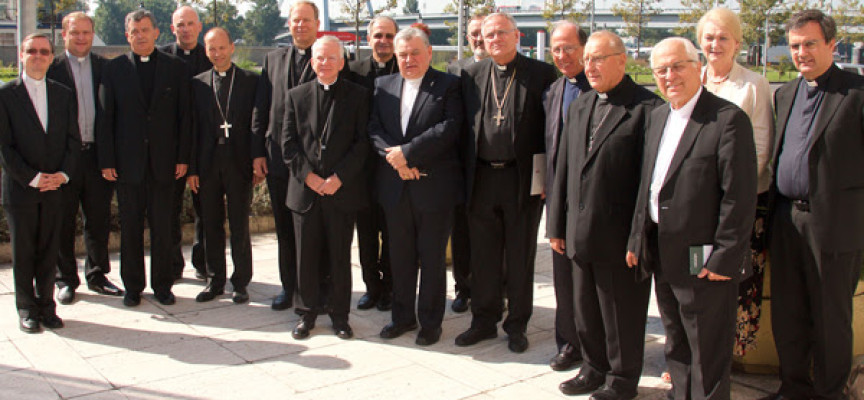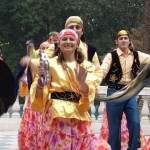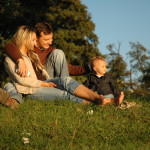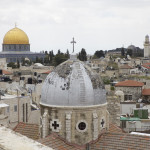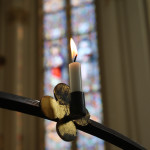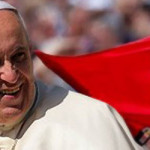Twenty-seven years after the fall of communist regimes in Central and Eastern Europe, Europe faces new challenges. The most important among them are the crisis of the family, connected with the demographic one, the crisis of faith and cultural identity. Lately, many countries are facing the numerous migrations from the Middle East and Africa. On 8th and 9th September, the representatives of the Episcopal Conferences of Central and Eastern Europe met in Slovakia, the country presiding over the EU Council, to reflect on these issues.
According to the participants it is essential that among European countries there is a real partnership based on the equal dignity of all peoples and mutual respect. Equally, it is important that national and European public structures develop a genuine dialogue with the representatives of the Christian churches, or with members of other religions.
The bishops believe necessary to awaken a reflection on the European Union, which has always been connected with the family based on marriage between a man and a woman. Only a society with children is a society with hope. The Church is aware of her obligation to bear witness to the good news of Christ in the world. That is why it appreciates and helps the family, the fundamental human community according to the Creator’s plan. Unfortunately, some decisions of the European structures bring the family and the protection of life in danger. At present, Europe needs first of all stable families and a cautious demographic policy. Immigration is not a solution to the demographic crisis.
The participants to the meeting are deeply touched by the suffering of people who are fleeing war conflicts, especially those ravaging Syria. At the same time, they feel pain for the terrorist attacks in Europe, with many victims. As a result, they feel right to develop more communication with the Muslim world and devote more effort to help the needy according to the divine commandment of love. The bishops feel a special duty to help the persecuted Christians, but do not exclude from their hearts any other human person in need of help, both in crisis regions of the world and in our countries.
Pursuing these human and Christian purposes, we must proceed with generosity and wisdom, considering the cultural, religious and economic circumstances of the European peoples and of those who arrive. The bishops perceive the fundamental difference between the situation in European countries, which are destinations of the migratory flow and those of Central and Eastern Europe, which are transit countries – with a standard of living that only comes to 20% of the Western one. In these countries, migrants generally do not wish to remain. The aid to be provided to them may require special actions, at times other than those adopted by other countries. In this context, it is legitimate and even necessary to reflect on how to design the future of the European continent, on which values to build the society and what place to give to religion.
The bishops pray for all victims of violence, war and terrorism. At the same time, address a serious appeal to the leaders of all European countries to develop a common and deep reflection about the future. They hope that Europe becomes a continent that puts the respect for human life in first place – from conception to death – and that support for the family and marriage occupy the first place in the awareness of public representatives as well.
Ventisette anni dopo la caduta dei regimi comunisti in Europa Centro Orientale, l’Europa affronta nuove sfide. Le più grandi tra di loro sono la crisi della famiglia, connessa con quella demografica, la crisi della fede e dell’identità culturale. Ultimamente, molti Paesi fanno fronte alle numerose migrazioni provenienti dal Medio Oriente e dall’Africa. Nei giorni 8 e 9 settembre, i rappresentanti delle Conferenze Episcopali dell’Europa Centro-orientale si sono incontrati in Slovacchia, Paese che presiede il Consiglio dell’Unione Europea, per riflettere su questi temi.
Secondo i partecipanti è fondamentale che tra gli Stati europei ci sia un vero partenariato basato sull’uguale dignità di tutti i popoli e sul rispetto reciproco. Ugualmente, è importante che le strutture pubbliche, nazionali ed europee, sviluppino un vero dialogo con i rappresentanti delle Chiese cristiane o con gli esponenti di altre religioni.
I vescovi ritengono necessario risvegliare la riflessione sull’identità europea, che è stata sempre connessa con la famiglia fondata sul matrimonio tra un uomo ed una donna. Soltanto la società con la prole è una società con speranza. La Chiesa è consapevole del suo obbligo di rendere testimonianza della buona novella di Cristo nel mondo. È per questo che apprezza e aiuta la famiglia, comunità umana fondamentale secondo il progetto del Creatore. Sfortunatamente, alcune decisioni delle strutture europee mettono la famiglia e la protezione della vita in pericolo. Attualmente, l’Europa, prima di tutto, ha bisogno di famiglie stabili e di una politica demografica prudente. L´immigrazione non è una soluzione della crisi demografica.
I partecipanti all’incontro sono profondamente toccati dalla sofferenza delle persone che sono in fuga davanti ai conflitti bellici, soprattutto quelli che devastano la Siria. Allo stesso tempo, sentono sofferenza per gli attacchi terroristici commessi in Europa, con tante vittime. Di conseguenza, ritengono giusto sviluppare più comunicazione con il mondo islamico e dedicare maggiori sforzi per aiutare i più bisognosi in base al divino comandamento della carità. I vescovi sentono il dovere speciale di aiutare i cristiani perseguitati, ma non escludono dal loro cuore nessun’altra persona umana bisognosa di aiuto, sia nelle regioni di crisi del mondo, sia nei nostri Paesi.
Perseguendo questi scopi umani e cristiani, bisogna procedere con generosità e saggezza, valutando le circostanze culturali, religiose ed economiche dei popoli europei e di quelli che arrivano. I vescovi avvertono la differenza fondamentale tra la situazione nei Paesi europei, che sono destinazioni del flusso migratorio, e in quelli dell’Europa centro-orientale, che sono Paesi di transito – con un tenore di vita che arriva solo al 20% di quello occidentale. In questi Paesi i migranti generalmente non desiderano restare. L’aiuto che deve essere prestato loro potrà richiedere azioni speciali, a volte diverse da quelle adottate da altri Paesi. In tutto questo contesto, è legittimo e anche necessario riflettere su come concepire il futuro del continente europeo, su quali valori edificare la società e che posto riservare alla religione.
I vescovi pregano per tutte le vittime della violenza, della guerra e del terrorismo. Nello stesso tempo, rivolgono un serio appello ai responsabili di tutti i Paesi europei affinché sviluppino una comune e profonda riflessione del futuro. Si augurano che l’Europa diventi un continente che metta al primo posto il rispetto verso la vita umana – dal concepimento fino alla morte – e anche che il sostegno alla famiglia e al matrimonio occupi il primo posto nella consapevolezza dei rappresentanti pubblici.
Vingt-sept ans après la chute des régimes communistes
Vingt-sept ans après la chute des régimes communistes en Europe Centrale et Orientale, l’Europe doit faire face à de nouveaux défis. Les plus importants étant la crise de la famille, liée à la crise démographique, la crise de la foi et celle de l’identité culturelle. Désormais beaucoup de pays doivent faire face aux nombreuses vagues migratoires provenant du Moyen-Orient et d’Afrique. Les 8 et 9 septembre, les représentants des Conférences Episcopales de l’Europe Centrale et Orientale se sont rencontrés en Slovaquie, pays qui préside le Conseil de l’Union Européenne, pour se pencher sur ces sujets.
Selon les participants, il est fondamental qu’entre les états européens il y ait un véritable partenariat basé sur l’égalité de dignité de tous les peuples et sur le respect réciproque. Il est également important de faire en sorte que les structures publiques, nationales et européennes, mènent un véritable dialogue avec les représentants des Eglises chrétiennes ou avec les représentants d’autres religions.
Les évêques estiment qu’il est nécessaire d’éveiller la réflexion sur l’identité européenne, qui a toujours été liée à la famille fondée sur le mariage entre un homme et une femme. Seule la société qui a des enfants est une société qui a de l’espoir. L’Eglise est parfaitement consciente de son obligation qui consiste à témoigner la bonne nouvelle de Jésus-Christ dans le monde. C’est pour cette raison qu’elle apprécie et aide la famille, qui est la communauté humaine fondamentale selon le projet du Créateur. Malheureusement, un certain nombre de décisions prises par les structures européennes mettent la famille et la protection de la vie en danger. Actuellement, l’Europe a besoin, tout d’abord, de familles stables et d’une politique démographique prudente. L’immigration n’est pas une solution à la crise démographique.
Les participants à la rencontre sont profondément touchés par la souffrance des personnes qui fuient les conflits armés, notamment ceux qui ont ensanglanté la Syrie. En même temps, ils souffrent pour les attaques terroristes commises en Europe qui ont fait tant de victimes. Par conséquent, ils estiment utile de développer davantage de communication avec le monde islamique et de consacrer de plus grands efforts visant à aider les personnes dans le besoin, tel que l’impose le commandement divin de la charité. Les évêques ressentent le devoir spécial d’aider les chrétiens poursuivis, sans vouloir pour autant exclure de leur cœur toute personne humaine qui ait besoin d’aide, aussi bien dans les régions du monde frappées par les crises que dans nos pays.
Tout en poursuivant ces buts humains et chrétiens, il est nécessaire d’avancer avec générosité et sagesse, en gardant à l‘esprit les circonstances culturelles, religieuses et économiques des peuples européens et de ceux qui arrivent. Les évêques perçoivent la différence fondamentale qu’il y a entre les pays européens, qui sont les pays de destination du flux migratoire, et les pays de l’Europe centrale et orientale, qui sont des pays de transit – avec un niveau de vie qui n’atteint que 20 % de celui de l’Occident. Dans ces pays, les migrants ne souhaitent généralement pas s’établir. L’aide qu’il faut leur apporter exige des actions spéciales, parfois différentes par rapport à celles qui sont adoptées dans d’autres pays. Ainsi, dans ce cas de figure, il est légitime et même nécessaire de réfléchir sur la façon dont on peut concevoir l’avenir du continent européen, sur quelles valeurs construire la société et quelle place faut-il réserver à la religion.
Les évêques prient pour toutes les victimes de la violence, de la guerre et du terrorisme. En même temps, ils souhaitent adresser un sérieux appel aux responsables de tous les Pays européens afin qu’ils mènent une réflexion commune et profonde sur l’avenir. Ils souhaitent que l’Europe devienne un continent qui mette à la première place le respect envers la vie humaine -à partir de la conception et jusqu’à la mort- et, de plus, que le soutien à la famille et au mariage soit au premier chef dans la conscience des représentants publics.
27 Jahre nach dem Untergang der kommunistischen Regimes
27 Jahre nach dem Untergang der kommunistischen Regimes in Mittel- und Osteuropa steht Europa vor neuen Herausforderungen. Die größten unter ihnen betreffen die Familie, den demografischen Wandel, sowie die Krise des Glaubens und der kulturellen Identität, und in letzter Zeit stehen viele Länder vor dem Problem der zahlreichen Migranten aus den Mittleren Osten und Afrika. Am 8. und 9. September trafen sich die Vertreter der mittel- und osteuropäischen Bischofskonferenzen in der Slowakei, die zurzeit den Vorsitz im Rat der EU führt, um gemeinsam über diese Probleme nachzudenken.
Den Teilnehmern zufolge ist eine echte, auf der Würde aller Völker und gegenseitigem Respekt basierende Partnerschaft zwischen den europäischen Staaten von grundlegender Bedeutung. Ebenso wichtig ist es, dass die öffentlichen Einrichtungen sowohl der einzelnen Länder als auch Europas einen tatsächlichen Dialog mit den christlichen Kirchen und den Vertretern anderer Religionen in die Wege leiten.
Die Bischöfe halten es für dringend angeraten, eine Reflexion über die europäische Identität anzustoßen, die sich seit jeher mit der Familie verbindet, welche aus der Ehe zwischen Mann und Frau hervorgeht. Nur eine Gesellschaft mit Nachkommen ist eine Gesellschaft der Hoffnung. Die Kirche ist sich ihrer Verpflichtung bewusst, die frohe Botschaft Christ in der Welt zu verbreiten. Daher würdigt und unterstützt sie die Familie, die fundamentale menschliche Gemeinschaft nach dem Plan Gottes. Bedauerlicherweise gefährden manche Entscheidungen seitens der europäischen Einrichtungen die Familie und den Schutz des Lebens. Gerade jetzt braucht Europa stabile Familien und eine vorsichtige demografische Politik. Einwanderung ist keine Lösung für die demografische Krise.
Die Teilnehmer der Tagung sind tief berührt von dem Leid der Menschen, die vor dem Krieg, vor allem dem in Syrien, fliehen. Gleichzeitig spüren sie das Leid im Zusammenhang mit den Terrorangriffen in Europa, die so viele Opfer forderten. Daher halten sie eine intensivere Kommunikation mit der islamischen Welt für richtig, und befürworten einen größeren Einsatz bei der Hilfe für die Bedürftigen, in Übereinstimmung mit Gottes Gebot der Barmherzigkeit. Insbesondere verspüren die Bischöfe das Bedürfnis, den verfolgten Christen zu helfen, jedoch werden sie ihr Herz keinem Menschen verschließen, der Hilfe braucht, sowohl in den Krisengebieten als auch in unseren Ländern.
Die Verfolgung dieser menschlichen und christlichen Vorsätze erfordert ein Vorgehen in Großzügigkeit und Klugheit; berücksichtigt werden müssen die kulturellen, religiösen und wirtschaftlichen Verhältnisse sowohl der europäischen Völker als auch derer, die erst in Europa ankommen. Die Bischöfe sehen einen grundlegenden Unterschied zwischen der Situation der Länder Europas, die Einwanderungsziele darstellen und den mittel- und osteuropäischen Staaten, die nur Durchgangsländer sind – und einen Lebensstandard haben, der höchstens 20% des westlichen beträgt. In diesen Ländern wollen die Migranten in der Regel nicht bleiben. Die ihnen gewährte Hilfe kann besondere Formen erfordern, die sich von denen unterscheiden, die in anderen Ländern angewandt werden. Angesichts all dieser Zusammenhänge ist es angebracht und notwendig, darüber nachzudenken, wie die Zukunft Europas aussehen, auf welchen Werten die Gesellschaft aufbauen und welcher Platz den Religionen zukommen soll.
Die Bischöfe beten für alle Opfer von Gewalt, Krieg und Terrorismus. Gleichzeitig richten sie einen ernsten Appell an die Verantwortlichen aller Länder, eine gemeinsame, tiefgreifende Reflexion über die Zukunft anzustoßen. Die Bischöfe hoffen, dass Europa ein Kontinent wird, wo die Achtung vor dem menschlichen Leben – von der Zeugung bis zum Tod – im Bewusstsein der öffentlichen Vertreter an erster Stelle steht, zusammen mit der Unterstützung von Familie und Ehe.
Dvadsať sedem rokov po páde komunistických režimov
Dvadsať sedem rokov po páde komunistických režimov v stredovýchodnej Európe čelí európsky kontinent novým výzvam. K najväčším z nich patrí kríza rodiny, spojená s demografickou krízou, kríza viery a kríza kultúrnej identity. V poslednom období viaceré krajiny čelia prílevu migrantov z Blízkeho východu a Afriky. V dňoch 8. a 9. septembra sa predstavitelia biskupských konferencií stredovýchodnej Európy stretli na Slovensku, ktoré akutálne predsedá Rade Európskej Únie, aby diskutovali o týchto témach.
Podľa účastníkov stretnutia je dôležité, aby medzi európskymi štátmi existovalo skutočné partnerstvo založené na rovnakej dôstojnosti všetkých národov a vzájomnej úcte. Rovnako je dôležité, aby verejné národné a európske štruktúry rozvíjali skutočný dialóg so zástupcami kresťanských cirkví a predstaviteľmi iných náboženstiev.
Biskupi pokladajú za nevyhnutné oživiť uvažovanie nad identitou Európy, ktorá vždy bola spojená s rodinou založenou na manželstve medzi jedným mužom a jednou ženou. Len spoločnosť s potomstvom je spoločnosť s nádejou. Cirkev si je vedomá svojej povinnosti vydávať vo svete svedectvo o Kristovej dobrej zvesti. Preto oceňuje a podporuje rodinu, základné ľudské spoločenstvo vytvorené podľa plánu Stvoriteľa. Bohužiaľ, niektoré rozhodnutia európskych štruktúr rodinu a ochranu života ohrozujú. Európa v súčasnosti potrebuje predovšetkým stabilné rodiny a rozumnú demografickú politiku. Imigrácia nie je riešením demografickej krízy.
Účastníci stretnutia hlboko súcitia s utrpením ľudí, ktorí utekajú pred vojnovými konflitkmi, predovšetkým pred bojmi v Sýrii. Zároveň sa ich bolestne dotýkajú teroristické útoky, ktoré v Európe spôsobili mnoho obetí. Pokladajú preto za potrebné, aby sa venovalo viac pozornosti komunikácii s islamským svetom a viac síl pomoci najchudobnejším – na základe prikázania lásky. Biskupi pociťujú osobitnú povinnosť pomáhať prenasledovaným kresťanom, ale nevylučujú zo svojho srdca nijakú osobu, ktorá potrebuje pomoc, tak v krízových oblastiach sveta, ako aj v našich krajinách.
Pri sledovaní týchto ľudských a kresťanských cieľov treba napredovať so štedrosťou i múdrosťou, hodnotiac kultúrne, náboženské a ekonomické okolnosti európskych národov ako aj tých, ktorí prichádzajú. Biskupi si uvedomujú dôležitý rozdiel medzi sitáciou v európskych krajinách, ktoré sú cieľmi migračných prúdov a situáciou v krajinách stredovýchodnej Európy, kde životná úroveň niekedy dosahuje len 20 % západnej. V týchto krajinách migranti vo všeobecnosti zostávať nechcú. Pomoc, ktorú im treba poskytnúť, si môže vyžadovať osobitné spôsoby – v istých prípadoch odlišné od tých, ktoré boli prijaté v iných krajinách. V celom tomto kontexte je legitímne i nevyhnutné uvažovať nad tým, ako poňať budúcnosť európskeho kontinentu, na akých hodnotách budovať našu spoločnosť a aké miesto v nej má mať náboženstvo.
Biskupi sa modlia za všetky obete násilia, vojny a terorizmu. Zároveň sa obracajú s vážnou výzvou na zodpovedných predstaviteľov všetkých európskych štátov, aby venovali úsilie spoločnému a zásadnému uvažovaniu o budúcnosti. Želajú si, aby sa Európa stala kontinentom, ktorý bude na prvé miesto klásť úctu k životu – od počatia až po smrť – a aby sa podpora rodiny a manželstva dostala na prvé miesto vo vedomí verejných predstaviteľov.
Latest posts by EURCOM (see all)
- What are the aims of the European security and defence policy? - 12 aprile 2017
- The Church is for the European project - 28 marzo 2017
- A message for Europe - 28 marzo 2017

